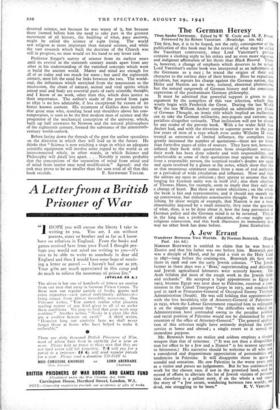The German Heresy
Thus Spake Germany. Edited by W. W. Goole and M. F. Potter. Foreword by Sir Robert Vansittart. (Roudedge. ros. 6d.) THE first, but, it is to be hoped, not the only, consequence of the publication of this book may be the revival of what may be called the Vansittart controversy, since Lord Vansittart's preface contains a slashing reply to his critics and an even more vigorous and indignant affirmation of his thesis than Black Record. There is, however, a change of emphasis which deserves to be noted. Lord Vansittart's earlier book was interpreted as an indictment of the Germans as a race ; .he traced the origins of their evil character to the earliest days of their history. Here he repudiates racialism, but repeats his charge against the German nation, that Hitler and Nazism are no new, isolated, abnormal phenomena, but the natural outgrowth of German history and the consistent expression of the predominant German philosophy. It must be admitted that powerful support is given to this argument by the compilers of this vast selection, which they wisely begin with Frederick the Great. During the last World War the late William Archer compiled as admirable sor Gems of German Thought, an ironic title which implied an inclination not to take the German militarists-, neo-pagans and extreme im- perialists altogether seriously. That inclination will not be shared by any reader of the present book. With a far wider field than Archer had, and with the elevation to supreme power in the past few years of men- of a type which even under Wilhelm II were treated as extremists of limited influence, the compilers have greatly increased the number of quotations—there are no fewer than forty-five pages of titles of sources. They have not, however, inflated their book with quotations from insignificant writers; their work has been done soberly and with responsibility, and unbelievable as some of their quotations may appear as deriving from a responsible person, the sceptical reader's doubts are again and again resolved by a glance at the notes, which show that this or that monstrous sentiment comes from a man of real authority or a periodical of wide circulation and influence. Now and then the editors are open to criticism ; they appear to assume that the longing for German unity was in itself evil; their: citations of Thomas Mann, for example, seem to impy that they rule out a change of heart. But these are minor objections ; on the whole the book is fair and representative, and it should not merely stir up controversy, but stimulate constructive thought. For in estab- lishing, by sheer weight of example, that Nazism is not a mere abnormality imposed by a small minority, they raise the question of what, then, is to be done about it, how the long perversion of German policy and the German mind is to be reversed. This is in the long run a problem of education, of—one might say— religious conversion, and this book illustrates its immensity in a way no other book has done before. JOHN STAPLETON.


































 Previous page
Previous page